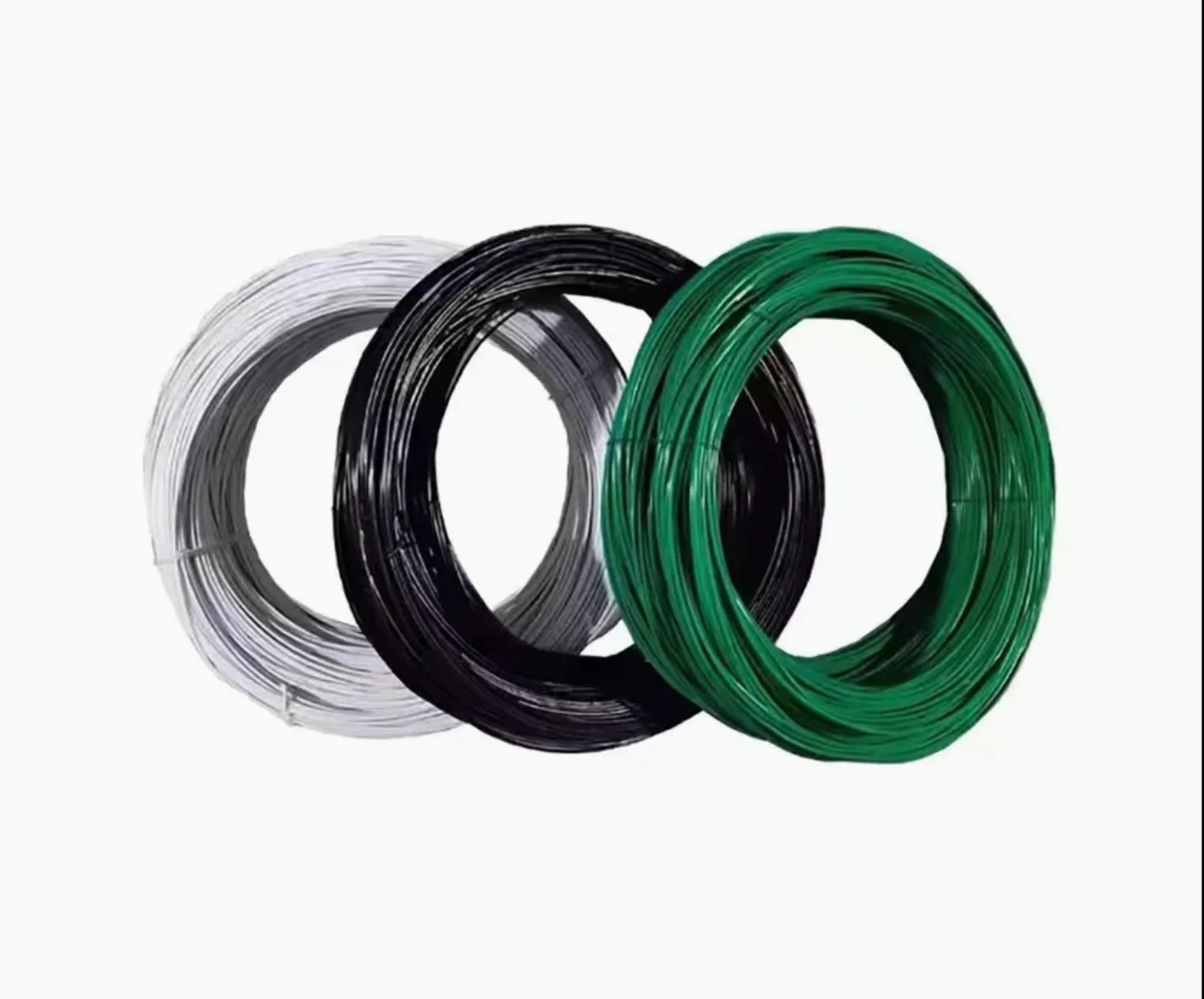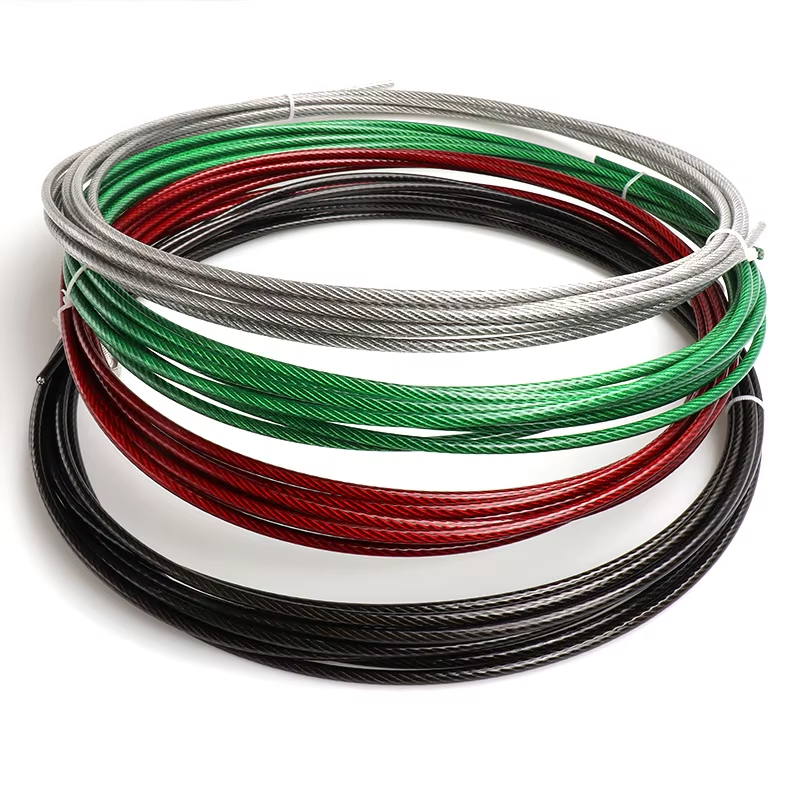
Have you ever wondered what keeps those massive machines in check, lifting and hauling with precision?
Polyurethane (PU) and polyvinyl chloride (PVC) are the top coatings for steel wire rope in heavy machinery. These coatings boost flexibility and abrasion resistance, while shielding against harsh conditions, guaranteeing long-lasting performance and reliability in demanding tasks.
Think back to that time you were on a construction site, watching cranes work tirelessly, lifting beams like they weighed nothing. Behind the scenes, those steel wire ropes were doing the heavy lifting, quite literally. Choosing between PU and PVC coatings might seem trivial, but it can make all the difference in performance and lifespan. Let's explore why each of these coatings is a go-to for ensuring your machinery operates smoothly, even under the toughest conditions. Whether you're dealing with relentless rain or scorching heat, these coatings offer the resilience needed to keep operations running seamlessly.
Polyurethane enhances steel wire rope flexibility.True
Polyurethane coatings improve the flexibility of steel wire ropes.
PVC coatings are not used for steel wire ropes.False
PVC is commonly used to coat steel wire ropes for protection.
Why Should I Choose Polyurethane Coating for Steel Wire Ropes?
I remember the first time I learned about polyurethane coatings and how they transformed my approach to sourcing steel wire ropes.
Choosing polyurethane coatings for steel wire ropes is a game-changer because they offer superior resistance to abrasion, corrosion, and temperature extremes, extending the ropes' lifespan and making them a savvy choice for demanding applications.

It was during a project that required materials that could withstand harsh conditions. The ropes we were using were wearing out too fast, costing us time and money. A colleague suggested polyurethane-coated ropes, explaining how they provide a durable shield against abrasion and corrosion. It was like a lightbulb went off!
Benefits of Polyurethane Coating
Polyurethane is like the superhero of coatings. It protects against corrosion—a lifesaver for ropes in marine environments1 where saltwater can be brutal. Plus, its abrasion resistance is top-notch, meaning those ropes can take a beating and still perform beautifully.
| Property | Polyurethane Coating | PVC Coating |
|---|---|---|
| Abrasion Resistance | High | Moderate |
| Flexibility | High | Low |
| UV Resistance | Excellent | Poor |
Flexibility and Performance
What truly stands out to me about polyurethane is its flexibility. Imagine bending something repeatedly and not seeing any cracks! That's crucial when ropes need to be maneuvered often. This quality keeps the ropes in top shape, ensuring they perform consistently over time.
Economic and Environmental Considerations
Switching to polyurethane coatings didn't just solve our durability issues; it was also a smart economic move. With fewer replacements needed, maintenance costs dropped significantly. And knowing that polyurethane is more eco-friendly than other coatings fit perfectly with our company's sustainability goals, aligning with broader environmental goals2.
Applications Across Industries
I've seen firsthand how industries like construction, mining, and marine shipping swear by these coated ropes. In mining, for instance, polyurethane-coated ropes excel in winches and cranes due to their heavy load capacity and durability under harsh conditions. This adaptability makes them a go-to choice for procurement professionals3 looking for reliable materials in challenging environments.
Polyurethane coating resists UV better than PVC.True
Polyurethane offers excellent UV resistance compared to PVC, which is poor.
Polyurethane-coated ropes are less flexible than PVC-coated ones.False
Polyurethane coatings provide higher flexibility than PVC coatings.
How Does PVC Coating Enhance Wire Rope Durability?
Ever wondered how a simple coating could transform the life of a wire rope?
PVC coating significantly boosts wire rope durability by acting as a shield against corrosion, abrasion, and harsh weather. This protective layer extends the rope's lifespan, making it ideal for diverse industrial uses.

I remember standing on a construction site, watching the cranes work tirelessly. The ropes, swinging and lifting with precision, were coated with a glossy finish. I learned that this wasn't just for show—it was PVC coating working its magic. This seemingly simple layer plays a crucial role in protecting wire ropes from the relentless elements they face every day.
The Science Behind PVC Coating
PVC, or Polyvinyl Chloride, is more than just a mouthful—it's a game-changer for steel wire ropes. This synthetic plastic polymer acts like armor, shielding the wires from moisture and corrosive elements that could lead to early wear and tear. The beauty of PVC lies in its flexibility, allowing the ropes to flex under pressure without losing their strength while ensuring long-lasting protection4.
Advantages of PVC-Coated Wire Ropes
| Feature | Benefits |
|---|---|
| Corrosion Resistance | Shields against rust and corrosion, essential for marine and outdoor use. |
| Abrasion Resistance | Protects against wear from friction and contact with rough surfaces. |
| Weatherproofing | Endures extreme temperatures, ensuring durability in diverse climates. |
Applications in Various Industries
When I think of the industries that rely on PVC-coated wire ropes, construction immediately springs to mind. Picture cranes hoisting massive beams into place—the safety and reliability of these operations often depend on such ropes under heavy stress5. In marine settings, where the air is salty and corrosive, these ropes are champions, resisting the harsh conditions that would otherwise lead to rapid deterioration.
Comparing PVC with Other Coatings
In my experience, choosing the right coating can be like picking the perfect tool for a job—each has its strengths. While there are other coatings like polyurethane and nylon, PVC strikes a balance between flexibility and cost-effectiveness at a price point that's hard to beat.
Unlike some other coatings, PVC doesn’t crack easily under stress or heavy loading6, which is vital when the ropes are subjected to heavy loads and constant bending.
Maintenance and Longevity
I've learned that taking care of your tools can save you a lot of headaches down the line. The same goes for PVC-coated wire ropes—regular inspections and gentle cleaning can keep them performing at their best for years.
Using mild detergents for cleaning ensures that the protective layer remains intact over time.
Conclusion: A Balanced Choice
While no one solution fits all scenarios, PVC-coated wire ropes offer an appealing mix of benefits for those in need of durable solutions. Their ability to withstand environmental challenges makes them a practical choice for anyone looking to blend longevity with safety.
For more insights on how different coatings compare, dive into resources about wire rope coatings7.
PVC coating enhances wire rope corrosion resistance.True
PVC forms a barrier that protects wire ropes from moisture and rust.
PVC-coated ropes are unsuitable for marine environments.False
PVC resists saltwater corrosion, making it ideal for marine use.
How Can I Properly Maintain My Coated Wire Ropes?
Ever had that sinking feeling when a crucial piece of equipment fails at the worst possible time?
To maintain coated wire ropes effectively, I regularly inspect them for wear, clean off debris, apply appropriate lubricants, and ensure they're stored in dry conditions. These practices prevent fraying and corrosion, helping to extend their lifespan.

Importance of Regular Inspections
Regular inspections of coated wire ropes are essential to identify any signs of wear or damage early. I remember the first time I realized how vital these inspections were during a hectic project when a wire rope nearly gave out. Now, I routinely check for visible signs like fraying or kinking and even run my hand along the rope to feel for inconsistencies.
These inspection practices8 should be part of a routine maintenance schedule to avoid unexpected failures during critical operations.
Cleaning and Lubrication
Dirt and grime? They're not just unsightly—they can spell disaster over time. Over time, dirt and debris can accumulate on the rope's surface, leading to abrasive damage. I make it a point to clean the ropes with suitable solvents that do not degrade the coating.
Lubrication is another key factor. That's a ritual for me. Use lubricants that match the coating material to prevent chemical reactions. Proper lubrication reduces friction and corrosion, making it the difference between smooth sailing and a screeching halt.
| Coating Type | Suitable Lubricant |
|---|---|
| PVC | Silicone-based Lubricant |
| Polyurethane | Petroleum-based Lubricant |
Storing Conditions
Picture this: ropes tangled in a damp corner—it's a nightmare! Store coated wire ropes in dry, well-ventilated areas to prevent moisture accumulation that can lead to rusting or degradation of the coating. Hanging ropes is recommended to avoid kinks.
Ensure that storage racks are free from sharp edges or abrasive surfaces that could damage the coating.
Conducting Load Tests
Load tests have become my go-to method for ensuring my wire ropes' integrity. Perform periodic load tests to ensure the integrity of the wire ropes. This practice helps reveal any hidden weaknesses, ensuring everything runs smoothly when it's game time.
Following load testing guidelines9 is essential for conducting these tests safely according to industry standards.
Keeping Track of Usage
I never underestimate the power of good record-keeping. Maintain a logbook that records usage history, including load weights, operational environments, and any incidents or damages reported. This documentation helps predict when a rope might be nearing its end of life.
Accurate record-keeping is vital for compliance with safety standards and provides insights into the rope's performance over time.
Seeking Professional Maintenance Services
When I'm unsure, seeking professional maintenance services can be advantageous. These experts provide thorough inspections, cleaning, and testing services which offer peace of mind.
They also offer valuable advice on best practices tailored to your specific operational needs, ensuring optimal performance and longevity of your wire ropes.
Regular inspections prevent unexpected rope failures.True
Inspections detect early signs of wear, preventing sudden failures.
Storing ropes in damp areas extends their lifespan.False
Moisture leads to rust and coating degradation, shortening lifespan.
How do you choose the right coating based on environmental conditions?
When I first had to choose a coating for steel wire ropes, I felt overwhelmed by the many options and environmental considerations. It was like trying to find the perfect outfit for unpredictable weather.
Choosing the right coating for steel wire ropes involves assessing environmental factors like temperature, humidity, and chemical exposure. Polyurethane provides flexibility and abrasion resistance, ideal for industrial use, while PVC offers moisture protection at a lower cost.

Understanding Environmental Factors
Environmental factors significantly impact the choice of coating. For example, high humidity areas require coatings that prevent rust and corrosion. In dry, hot climates, coating flexibility10 becomes essential to handle temperature fluctuations without cracking.
Temperature Considerations
Temperature can be a silent foe. I learned this the hard way when a PVC-coated rope turned brittle during a cold snap. Thankfully, polyurethane coatings can handle higher temperatures due to their thermal stability, making them ideal for industrial settings where heat is a constant companion.
| Coating Type | Temperature Resistance | Best Use Case |
|---|---|---|
| Polyurethane | Up to 150°C | Industrial environments with heat exposure |
| PVC | -20°C to 60°C | Moderate climates, general use |
Humidity and Moisture
Humidity can be sneaky, creeping into every nook and cranny. In places with high moisture or water exposure, the right coating is your best defense. I found polyethylene coatings particularly robust against water ingress—perfect for marine settings where ropes are constantly tested by the elements. It’s essential to consider humidity levels11 to prevent premature degradation.
Chemical Exposure
In some work environments, chemicals lurk around every corner. Once, in an industrial plant, I witnessed how certain coatings degraded due to chemical exposure. Teflon or fluoropolymer coatings offer superior protection in such harsh settings. Considering chemical exposure12 is critical to ensure the durability and longevity of your ropes.
Mechanical Wear and Tear
High-stress areas can take a toll on wire ropes, as I observed in mining operations where abrasion was a constant challenge. Here, polyurethane shines with its excellent wear resistance, ideal for environments where ropes frequently face friction or impact.
Evaluating Coating Options for Specific Industries
Each industry has unique requirements based on their operational environments:
- Construction: Prioritize coatings that combine flexibility with UV resistance.
- Mining: Focus on wear-resistant coatings capable of handling heavy loads.
- Marine: Choose corrosion-resistant coatings that withstand saltwater conditions.
Understanding these factors has been invaluable in helping procurement managers like John or Emma make informed decisions about coatings for their steel wire ropes, ensuring safety and efficiency in their operations.
Polyurethane coatings resist high temperatures.True
Polyurethane coatings are stable up to 150°C, suitable for heat exposure.
PVC coatings are ideal for cold environments.False
PVC becomes brittle in cold conditions, not suitable for low temperatures.
Conclusion
Polyurethane and PVC coatings enhance steel wire ropes' durability, flexibility, and resistance to harsh conditions, making them essential for heavy machinery in construction, mining, and marine industries.
-
Explore how polyurethane's corrosion resistance makes it ideal for marine applications, offering protection against saltwater damage. ↩
-
Learn about polyurethane's eco-friendly properties and its role in sustainable industrial practices. ↩
-
Find out why sectors like construction and mining prefer these coatings for enhanced reliability and performance. ↩
-
Explore how PVC coating offers superior corrosion resistance, crucial for extending wire rope lifespan in harsh conditions. ↩
-
Discover why PVC-coated wire ropes are favored in construction for their durability under heavy loads. ↩
-
Learn why PVC is preferred over nylon in scenarios demanding flexibility and resistance to cracking. ↩
-
Understand how different coatings stack up against each other in terms of performance and cost. ↩
-
Learn about effective methods for inspecting coated wire ropes to ensure safety and longevity. ↩
-
Discover industry-approved techniques for conducting safe and effective load tests on wire ropes. ↩
-
Learn how polyurethane coatings maintain flexibility under extreme temperatures, enhancing durability. ↩
-
Explore how different coatings react to humidity to prevent premature degradation. ↩
-
Understand Teflon's chemical resistance properties for optimal protection in harsh environments. ↩

